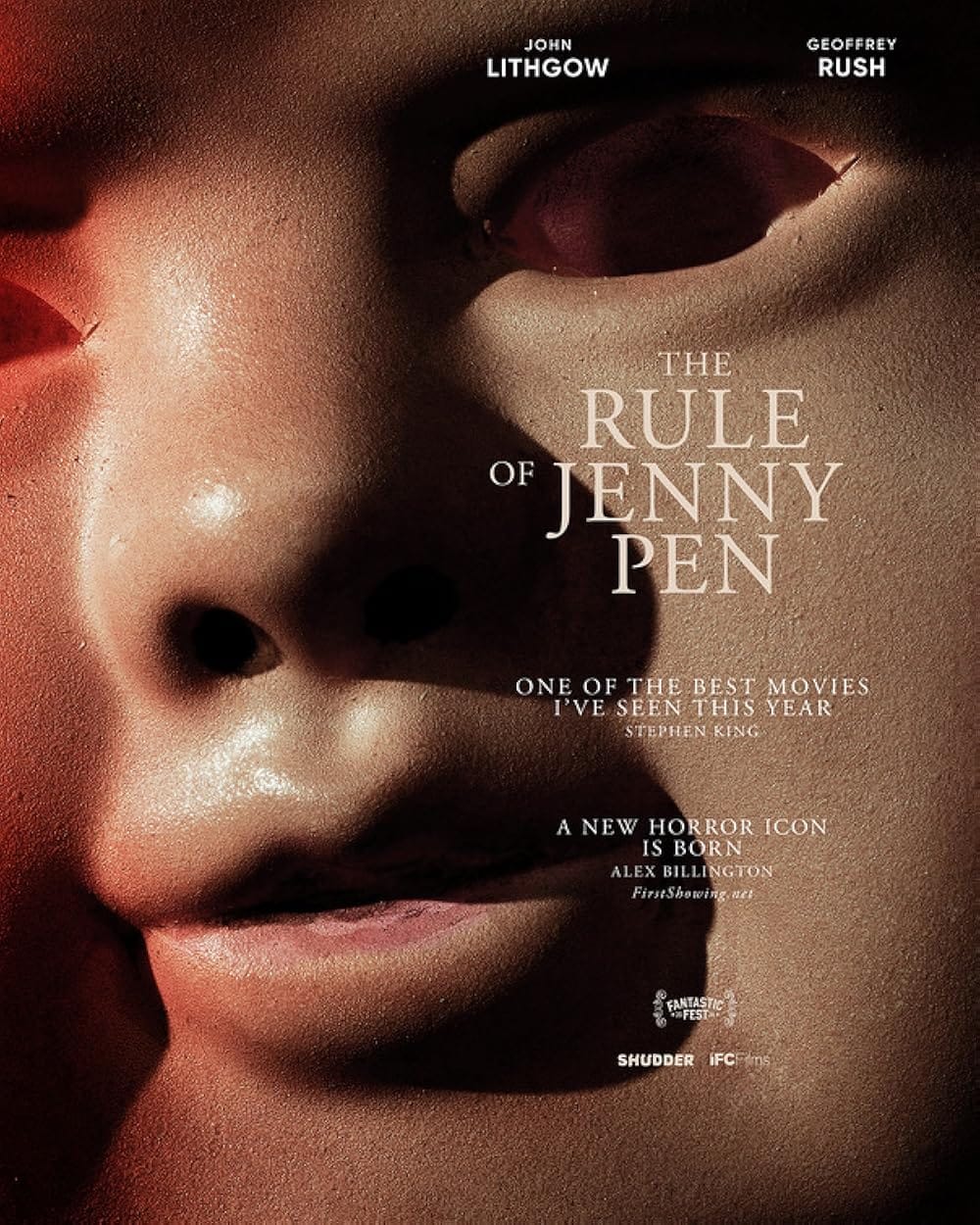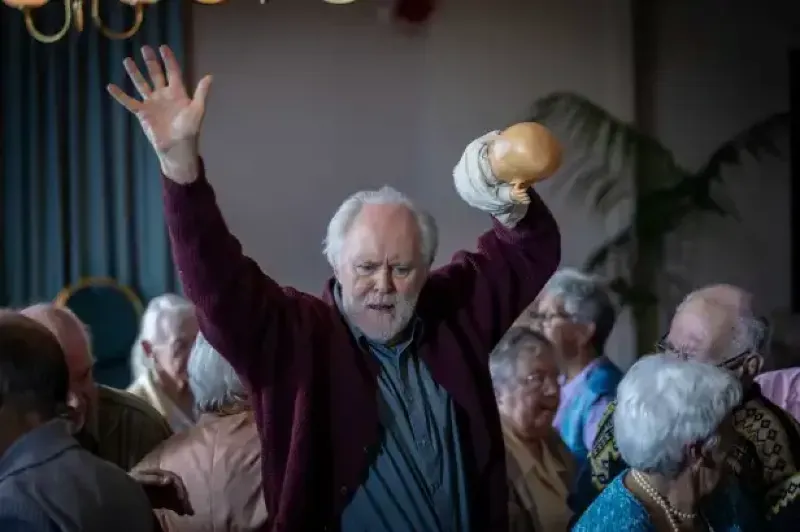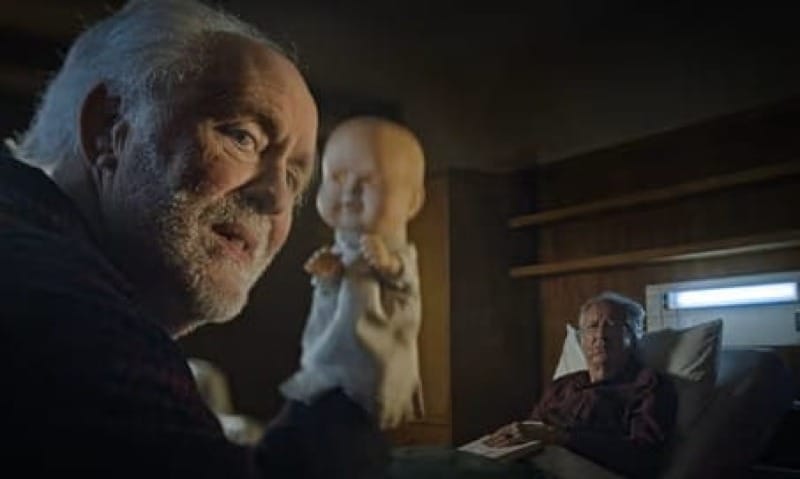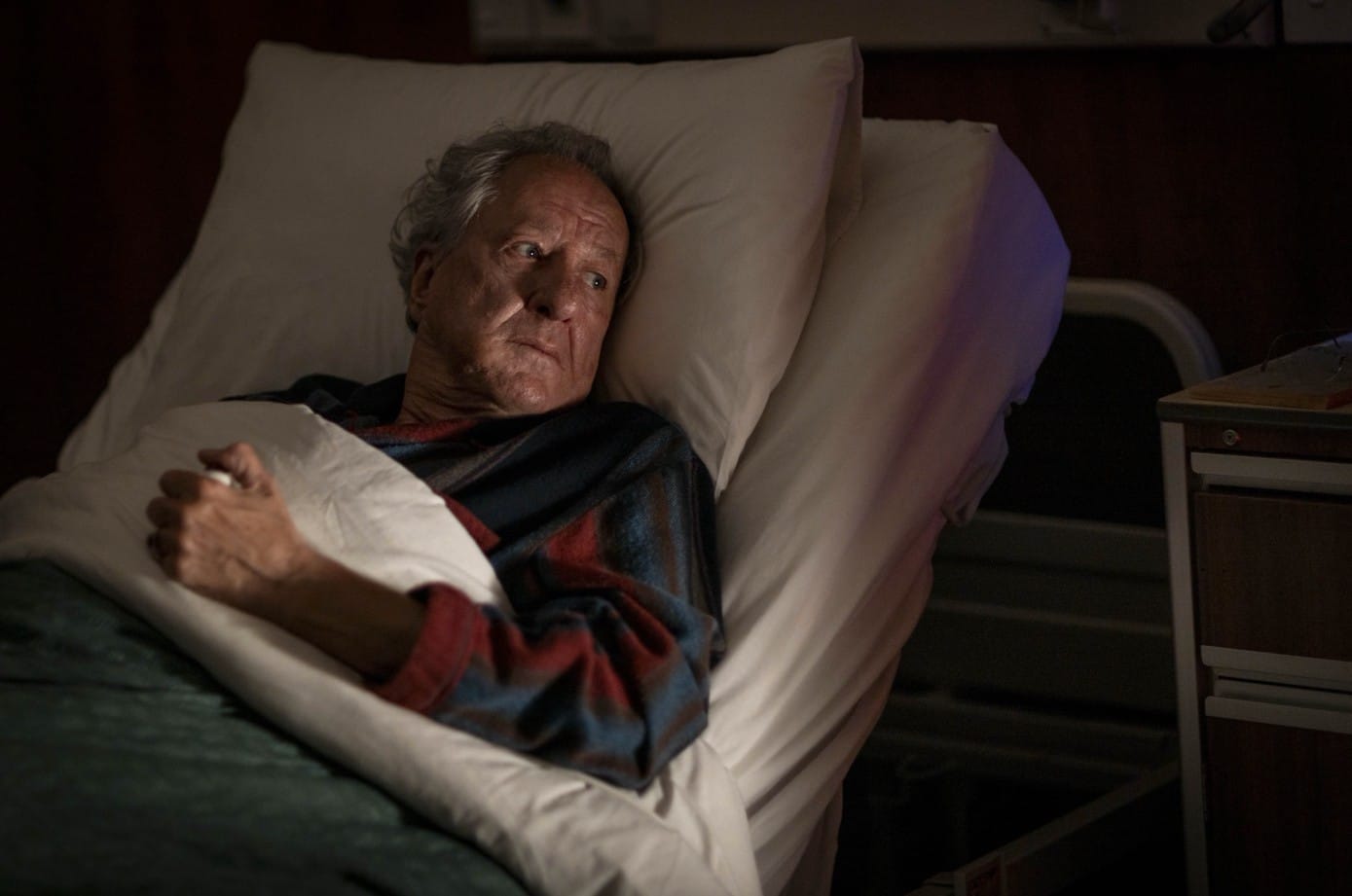The Rule of Jenny Pen
"Who rules?"

While he is recovering from a stroke, a former judge encounters a psychopathic patient who uses a hand puppet to abuse his fellow residents at an assisted living facility in New Zealand.
The logo of the distribution company at the beginning of the film tipped my wife off as to what we were about to watch. "Wait a minute... it says Shudder! This is a scary movie!" she said accussingly. I feigned confusion. But we were not quite prepared for exactly what kind of scary movie The Rule of Jenny Pen is...

Stefan Mortensen is an elderly judge in New Zealand, who, after passing sentence in court, collapses from a sudden stroke.
I assume that this sudden infirmary nullified his ruling, which probably means that the man who was seemingly very credibly accused of sexually abusing children may have gone free. We don't know if this is what happens, of course, it's not part of the movie, not to mention fictional, obviously, but what it does do, is illustrate yet another reason why Boomers need to stop squatting in positions of power like a bunch of liver-spotted, power-hungry Gollums until they fucking die at their desks, and as a result, fuck over the rest of us more than they already have.
Case in point, Roe v. Wade.
Anyway, this greedy old Boomer prick ends up on the far end of a stroke that leaves him partially immobile, and mostly confinded to a motorized wheelchair. He is forced to recover in a somewhat shabby, no-frills, assisted living center called the Royale Pine Mews. It is a place that is filled with the abandoned and the dying, forgotten toys slowly running down in the back of a closet.
Stefan is a cantankerous, high-handed old man, someone who clearly prided themselves on their intellectual prowess and station in life, so he is furious to be stuck in a place like this. He clearly considers the facility to be beneath him, nor does he consider the residents to be his equals. But one thing he does share with many of them, is that he assures himself that his stay here is only temporary.

On his first day, while tooling around in his motorized wheelchair, Stefan meets another resident, Howie, while the man is drinking and smoking outside. The care home cat watches from nearby, and Howie tells Stefan the cat knows when you're going to die, so everyone avoids it. Stefan goes out to the yard, to stand on his own, defiant of his new situation, while behind him, Howie spills some of his booze on himself, then drops his cigarette, and as Stefan watches, burns to death.
Perhaps the cat truly does know something.
Despite his strenuous objections, Stefan must share his room with a formerly somewhat well-known rugby player named Tony "Gunner" Garfield, a man long retired after a hip injury sidelined him. Tony is meek and stoop-shouldered, with a hangdog face, and Stefan soon finds out why...

It's because of another resident at Royale Pine Mews named Dave Crealy.
Tall and imposing, with a mouthful of crooked teeth, Dave is a racist bully who pretends by day to be a gentle, somewhat lost in the haze, and ultimately harmless old soul. But by night, he terrorizes the bewildered and helpless other residents of the home, using his therapy hand puppet, Jenny Pen.
Jenny Pen is almost constantly on his right hand. It's a filthy-looking thing of threadbare old cloth and long ago sun-faded plastic. The doll is missing its eyes, so the light glows balefully through the plastic at the back of its head, making the sockets glow like fire.
It's basically the worst doll imaginable.
With it, Dave looms over the other residents at night as they recoil in terror, trembling in their beds, and demands, "Who rules?" And once they whisper the answer, "Jenny Pen," he makes them lick Jenny Pen's "asshole" which is the back of his wrist.
Dave Crealy is the terrible and monstrous king of the Royale Pine Mews, and the immutable and terminal drudgery of those long afternoons spent in the day room is his kingdom. There, he is a capering demon, delighting in the hurt and ill will he spreads, disrupting what little joy the residents can find, and shredding the tattered remnants of their dignity at every opportunity.

Dave has a particular hatred for Tony and Stefan.
He visits their room in the night, using Jenny Pen's falsetto to rouse them from their slumber, bleary-eyed and unprepared for the midnight menace and pre-dawn dread he brings with them. Slapping, punching, and mocking them, dousing them in their own urine, leaning in close, his spittle painting their faces, leering at them, he clearly enjoys every bit of it.
The Royal Pine Mews is too short-staffed to begin with, and the few who are employed there are tired and over-worked, or just plain old don't give a shit. They don't believe Stefan's complaints about Dave. Tony and the other residents are too scared to back him up, and besides, Dave is clever enough to make it look like it's Stefan who is either lying, or showing signs of dementia. Either way, they view him as just another pain in the butt old man barely worth the trouble of keeping alive.

Through it all, Stefan believes that he will recover from his stroke and will be able to go home to his old life again. But soon enough he comes to realise that this will not happen, that his condition will worsen, and that someday, after a time spent as a drooling vegetable wilting in the day room sun, he will die here.
Despondant, Stefan tries to drown himself in the bath. But he can't go through with it, and tries to sit back up, only to find that he has overestimated his strength. He flails weakly beneath the surface, grasping at the rails, and is saved at the last by a care assistant.
Resigned to this hell, Stefan turns from hope of escape to planning for survival, and discovers, while looking at the old staff photos, that Dave has actually been at the Royal Pine Mews care home for decades. First as a young man working there, and eventually as a resident.

Defiant, bristling with his own hate and bitterness, Stefan resists Dave that night, driving him off. Angry at the insolence, Dave stalks the halls until he happens upon another resident, Joyce, an elderly woman with dementia. He tricks her, and leads her out of the building and through a gate at the edge of the grounds. He points her towards the woods, assuring her that her family is just over there, waiting for her.
She is found dead in a puddle the next day.
Knowing exactly what happened, Stefan tries to dispatch Dave by emptying out all of his asthma inhalers, and then riling Dave up to the point where he almost dies of an asthma attack.

Almost.
For a brief moment, Dave's absense is like a new life being breathed into the Royale Pine Mews. But upon his return, he is worse than ever. Dave knows what Stefan did, and he attacks him, all in order to frame Stefan as having violently attacked Dave and some other residents. That night, as Dave looms over him, Stefan finally admits that Jenny Pen rules and licks her asshole.
But there's a plan...
Stefan's roommate Tony had long cowered before Dave, afraid of retribution, and even more so, of having his family think he is weak and pathetic for being bullied. But seeing Stefan's example, Tony stands up to Dave, challenging him by doing a haka in the dining room.
Dave is as much a racist as a bully, so he shows up in the room that night to teach Tony a lesson. But Tony is gone. Hunting through the facility's darkened hallways, Dave finds Tony's hiding spot in the linen closet, but Stefan is there too. He and Tony smother Dave beneath a pile of blankets. The next day, Stefan burns Jenny Pen upon the home's bbq. The despot now dispatched, peace settles down over the sedate daily activities in the Royale Pine Mews day room. All is well.
And that's when the cat begins to take an interest in Stefan.

Based on a short story by Owen Marshall of the same name, all of the marketing about The Rule of Jenny Pen seems to imply that it's something it isn't, and the film itself encourages this. Especially when it opens with an old man randomly burning to death at the beginning of the film.
To be fair, when I was working at the cemetery, I once buried an old lady who dropped her cigarette and her dusty old polyester clothes went up in an instant, so suddenly burning yourself to death isn't unheard of. Still, the main question you have going into this, and also while watching… is Dave a bully, or is he a demon? Like, is he actually possessed by something? Or is he just a more run-of-the-mill kind of monster? Because going into this film, it seems like it's going to be a basic demonic horror film, like a darker Bubba Ho-tep. But in actuality, the thing you slowly realize while watching, is that it's really a horror film about the monsters who live amongst us, the petty and ugly little vindictive monsters of privilege.
Because as much as Dave is an abuser and a racist, he is also bitter and twisted over how he is a nobody. As Dave speaks on memories of watching Stefan once give a talk in a hotel while he was in the next room mopping the floors, it’s clear that he's angry at how his life turned out, that he was just a menial laborer, a man whose long life amounted, as he views it, to nothing, and how, in the end, he’s in the Royal Pine Mews, a place where he’s always been, alone and unremarked. His presence will be missed by none. His passing will go unacknowledged. He knows this. The knowledge has curdled inside of him.
So now, Dave hates anyone he believes has had a life of note, like Tony, the once professional rugby player, and Stefan, the once respected judge. He also seems to hate people who have families, even absent ones, like Joyce. It's a blind hate, born from the same motivation that makes him a racist and an abuser. He doesn’t say it out right, but it’s clear through his actions, Dave believes he was denied something that was meant to be his by right of birth. Power. Respect. Acknowledgement.
If these years of COVID and Trump have taught us anything, it’s that cruelty always walks hand-in-hand with entitlement. And Dave’s entitlement is not just the result of a rotten cultural, but also because, since he has always been there at Royals Pine Mews, he can take advantage of the system. He’s indulged, dismissed as harmless by the staff, and allowed to roam at will. This is why Dave is able to do what he does.
That Dave takes his hate out on people who are just as abandoned and forgotten as he is, whose "lives of note" were still unable to buy them any better end-of-life care than he gets, only demonstrates how completely irrational he is. It also shows how uninterested people like Dave are when it comes to acknowledging reality. Because much like Dave, all they care about is their hate. Much like Dave, all they will ever care about is their hate.
And much like Dave, all they want to do is hurt others.
As for the rest of us, we’re basically in the same situation as Tony and Stefan, and it increasingly looks like our only option, if we want to survive, is to smother those motherfuckers under a pile of clean towels.

Anyway… Lithgow and Rush are both fantastic here as two men on opposite sides of the same coin, a mismatched pair of unpleasant adversaries.
Stefan was clearly a powerful and respected judge, but also seems to not have any friends or family either. The reasons why this is are probably related to the fact that he is a sanctimonious and condescending dickhead, rude and contemptuous to staff, as well as those that he sees as his inferiors. Dave, of course, is demented and more dangerous, but they are undeniably cut from the same cloth. Dave’s little kingdom may be a tiny and shabby corner, but he lords over it with much the same attitude that we can assume that Stefan displayed from the bench.
In the beginning, Stefan tells the mother of the victims in the child sexual abuse case he is presiding over that she is no victim, that, through her inaction, she is the one who allowed all of this to happen, that "where there are no lions, hyenas rule." Later in the film, it seems to imply that Dave is a hyena, and so Stefan must be a lion. But to me, it makes more sense that both of these men are lions, and this is nothing more than a war for dominance, something we can safely assume that they have both participated in before, most likely throughout their lives.
I think that's why there's so much spilled pee in this film.

The Rule of Jenny Pen is a film about about the loss of dignity, and the horror of being forgotten and abandoned, all of which is illustrated through blunt depictions of aging, of medical gaslighting, of elder abuse, and sexual abuse, both of children and of the elderly. It's also a film about isolation, highlighted by the fact that all of the outsiders we see are wearing COVID masks. And it’s also a film that shows us how a person’s hatred and petty jealousies and undeserved entitlements will only make a society worse, and that the only way to save that society is to violently cut that cancer out.
It's all very horrifying and sad, and beyond the horror and the tension, it's a depressing commentary not just on society's willingness to throw away people it views as unwanted and burdensome, but also how some people can not be saved, that some people can not redeemed, and their continued presence in society does nothing but damage.
But despite all of this, this is also a film about trying to find happiness where you can, about protecting your dignity, and the benefits of building community, as well as a film about personal agency, and taking action to make things better, even when the whole world seems to be against you.
When it works, The Rule of Jenny Pen is a real gut-shot. It's a nice little horror film, the kind that will make you squirm, and stick with you. But far too often, the film is bogged down by uneven pacing, as well as a too-long runtime. There are too many moments that don't add anything to the film, or lead anywhere, and there are some flourishes that, while I liked them, really only serve to confuse the reality of the film's world. This is made all the worse as these flourishes are never given any kind of anchor in the reality of story. Mostly, the shifts between being a black comedy and a horror film are too rough. It's too bad the filmmakers weren't able to meld those tones togeather more effectively.

Still, The Rule of Jenny Pen is truly merciless at times.
It never shies away from showing us just how horrifically vulnerable these characters are, whether naked in the shower or the bath, being tortured in their bed, or simply trying to stand on their own. It doesn't relent, and it doesn't back down on the tension. It's a slight story in the end, and not one without its issues, but it's definitely worth a watch.
So, pretty good. Not great, but pretty good.
